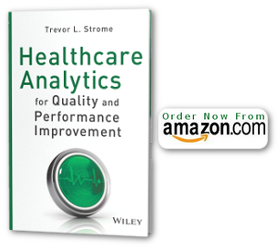Is your organization data-centered?
It’s a very powerful moment when you realize that the culture within your healthcare organization (HCO) is becoming data-centric. When this occurs, stakeholders at all levels (from front-line nurses to middle-management and senior executives) are interested in and actually use the information end-products available from business intelligence implementations. Information becomes important in almost all aspects of an organization’s operations, such as supporting decision-making, improving workflows, and (perhaps most importantly) satiating curiosity for insight into the HCO’s drivers and operational processes.
Currently, many (if not most) healthcare organizations are not truly data-centered. There are several models that describe stages of health information systems and business intelligence maturity. (For example, see the HIMSS Electronic Medical Record maturity model or The Data Warehouse Institute Business Intelligence Maturity Model.) But because healthcare has been information-deficient for longer than most other modern industries (due in part to slow adoption of electronic clinical systems), healthcare analytics and business intelligence has mainly been the domain of HCO administrators with MBA or accounting training.
Moving towards the future
Encouraging, though, are recent trends towards including front-line staff in process improvement activities using methodologies (such as Lean and Six Sigma) that rely on data for identifying issues, establishing benchmarks, and evaluating progress. These activities have been removing barriers to the access and use of healthcare data (especially now that more data is becoming available). It is now not uncommon for front-line clinical staff to be aware of organization performance metrics and to be exposed to and understand the data that drives organizational decision-making. As a result of staff-involved quality improvement initiatives, front-line staff are even initiating their own requests for data to provide further insight into their own particular areas of operation.
Not only are these developments exciting, but this level of front-line involvement is critical to the success of any healthcare business intelligence initiative. If front-line staff are not supportive of BI efforts, and are not able to see the value in the information being collected, analyzed, and disseminated, they are less likely to trust the data or utilize it to guide and/or evaluate process and quality improvement activities.
First steps towards a data-centered healthcare culture
So, how do you get front-line staff engaged in your business intelligence implementation?
Simple… ask them what they want.
Rather than merely posting metrics that are important to management and executive, develop reports or build dashboards that include a healthy dose of front-line inspired data. Get out to the front-lines and ask them what they would like to know. Front-line clinicians always have pressing questions and a desire to know information of which management and analysts may not be aware.
Once an HCO can move beyond the somewhat immature mentality that the only information that’s important is what management decides is valuable, a very meaningful dialog between BI developers and front-line staff can evolve to where front-line clinicians are actively engaged in the development of their own indicators and are very active users of data.
It is only once the front-line staff are actively engaged in the use and development of business intelligence end-products (such as reports) or applications can BI really begin to impact an HCO on a large scale. This truly will be the path towards becoming a data-centered organization.

{ 0 comments… add one now }